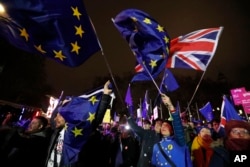British and European Union negotiators expressed different views Wednesday on the state of Britain's exit from the EU after British lawmakers gave Prime Minister Theresa May what she called a "mandate" to seek changes to the country's withdrawal agreement.
A series of votes in the British parliament Tuesday resulted in May's party getting approval for its plan to seek "alternative arrangements" to the Irish border provision of the current Brexit deal.
British Brexit minister Stephen Barclay told BBC radio in an interview Wednesday that those changes would be the subject of negotiations in the coming days.
But on the EU side, chief Brexit negotiator Michel Barnier said the bloc's position "is very clear."
"The only point I want to make is to confirm that the EU institutions remain united and we stand by the agreement we have negotiated with the [United Kingdom]," Barnier told reporters in Brussels on Wednesday.
He said European Commission President Jean-Claude Juncker would address the issue later in the day.
Britain's House of Commons rejected May's Brexit plans two weeks ago, primarily because of the Irish border provision, known as the backstop, which would be in place until Britain and the EU could negotiate a new post-Brexit trade deal.
The backstop would keep Britain in a customs union with the EU in order to keep a free flow of goods between Ireland — an EU member — and Northern Ireland, which is part of the UK.
Backstop opponents who still support the idea of Brexit say it means Britain would still be subjected to EU rules, which is the reason they want Britain to leave the EU in the first place.
Without an agreement in place, Britain faces a "no-deal" Brexit departure.
U.S. Director of National Intelligence Dan Coats told a congressional panel in Washington Tuesday such an outcome "would cause economic disruptions that could substantially weaken the [United Kingdom] and Europe."
Business leaders are worried that a no-deal Brexit would lead to economic chaos.
British opposition Labor leader Jeremy Corbyn said he believes the British government would have to delay its Brexit departure for three months to allow for more negotiations.
European Parliament Brexit negotiator Guy Verhofstadt said Wednesday it is not in anyone's interest to prolong the process.






